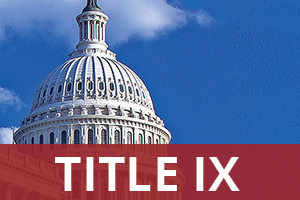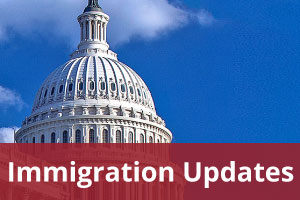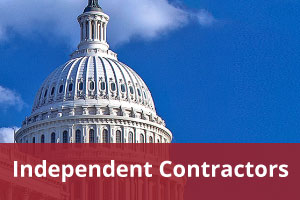by CUPA-HR | February 14, 2024
Each month, CUPA-HR General Counsel Ira Shepard provides an overview of several labor and employment law cases and regulatory actions with implications for the higher ed workplace. Here’s the latest from Ira.
Basketball Players Are Employees of Dartmouth, NLRB Concludes—Union Vote Scheduled for March 5
Student-athletes on the Dartmouth College men’s basketball team will vote March 5 on whether to join a union in an election supervised by the National Labor Relations Board. The applicable NLRB regional director issued a decision on February 5, holding that the basketball players are employees of Dartmouth, as the institution provides compensation to the athletes and exerts control over them (NLRB Reg’l Dir., No. 01-RC-325633, 2/5/24, 2/9/24).
The basketball players filed a petition to be represented by the Service Employees International Union, Local 560, in September. Dartmouth has indicated that it will appeal the regional director’s decision to the full NLRB after the March 5 election.
The regional director decided that the basketball players meet the definition of employees under the National Labor Relations Act because “Dartmouth has the right to control the work performed by the Dartmouth men’s basketball team.” The regional director further held that the athletes receive compensation in the form of equipment totaling nearly $3,000 an athlete per season, tickets to events, and travel and lodging from the institution.
This is the first time that the NLRB has ruled that student-athletes are employees under the NLRA. In 2014, the NLRB declined to take jurisdiction over Northwestern University football players in denying an election in that case. The regional director in the Dartmouth case concluded that nothing in the Northwestern case precluded a later decision that student-athletes are employees under the NLRA.
This issue is also being litigated by the NLRB on the West Coast in unfair labor practice proceedings alleging that student-athlete basketball and football players have been improperly classified as students and not employees of the University of Southern California, the NCAA and the PAC-12 Conference.
SpaceX Challenges Constitutionality of NLRA
SpaceX filed a formal complaint in federal district court in response to a complaint the NLRB issued. The NLRB’s complaint concerned SpaceX firing eight employees over a letter they filed within the company’s internal distribution network. The letter called into question SpaceX CEO Elon Musk’s public comments and called for the organization to distance itself from Musk. The employees were fired, and the NLRB issued a complaint alleging that they were fired in violation of the NLRA as a result of engaging in concerted activities protected by the NLRA.
SpaceX alleges that the NLRA is unconstitutional because it violates the separation of powers and deprives the employer the right to a jury trial (Space Exploration Technologies v. NLRB et al (Case No. 1:24:00001 S.D. Tx. 1/4/24)). The lawsuit specifically alleges that the NLRB’s structure of requiring complaints to be heard and initially adjudicated by administrative law judges, with appeal rights to the NLRB and eventually to the U.S. Court of Appeals, deprives employers their right to a jury trial. SpaceX alleges that the NLRB’s administrative structure violates its Sixth Amendment right to a jury trial on criminal matters.
NLRB Seeks to Bring More Higher Ed Religious Institutions Under Its Jurisdiction
In a recent hearing over a case primarily involving whether the NLRB should have jurisdiction over student-athletes, the NLRB attorneys also asked the administrative law judge (ALJ) to reverse the Trump-era, 2020 decision in the Bethany College case, which broadly exempted religiously affiliated, non-profit, higher ed institutions that hold themselves out publicly as religious institutions.
The NLRB attorneys argued that the Bethany case was wrongfully decided and that the ALJ should return to the NLRB’s prior rule laid down in the Pacific Lutheran case. Under the Pacific Lutheran decision, religious higher ed institutions are exempt from NLRB jurisdiction only if the faculty members perform religious functions in addition to lay teaching responsibilities.
Appeals Court Revives Professor’s Claim That Termination Violated His Contract Without Due Process
The 5th U.S. Circuit Court of Appeals (covering Louisiana, Mississippi and Texas) reversed a lower court’s dismissal of a tenured biology professor’s contract violation claim stemming from his termination. The appeals court ruled that the trial court erred in concluding that the Jackson State University professor’s claim was barred by the statute of limitations. The professor was terminated for alleged unauthorized research, which stemmed from his use of unauthorized undergraduate students to assist in his research involving the use of human urine.
The professor was suspended in 2015. The department chair concluded in mid-2015 that he would recommend the professor’s termination based on the reports he heard. In 2018, the faculty personnel committee sided with the professor, but the university president rejected the committee’s reinstatement recommendation in 2018. In March 2019, the board of the Mississippi Institutions of Higher Learning (IHL) terminated the professor per the university president’s decision. The professor sued in 2022, and the trial court dismissed on three-year statute-of-limitations grounds. The appeals court reversed, holding that the IHL decision, which was the final termination decision, was when the statute of limitations would start running and therefore the lawsuit was filed within the three-year statute of limitations and can go forward.
EEOC on Alert for Workplace Discrimination Resulting From Israel-Hamas War
At her first press event as the Equal Employment Opportunity Commission’s new general counsel, Karla Gilbride indicated that the EEOC has received reports from workers and advocacy organizations representing the Jewish, Muslim and Arab communities of an increase in workplace discrimination against protected groups resulting from the Israel-Hamas war. The EEOC has signaled interest in pursuing domestic workplace discrimination that may result from “local, national or global events.” The general counsel indicated that it is a priority in the agency’s strategic enforcement plan to be responsive in this area.
Gilbride concluded, “We’re reviewing that data to get a better handle on whether we at EEOC are recognizing an uptick in discrimination on the basis of religion or national origin affecting Jewish, Muslim and Arab communities or people who might be perceived as belonging to those communities even if they did not actually belong to those communities.” The general counsel indicated that global events in the past, such as 9/11, have led to an increase in domestic workplace discrimination.
Employee at University of Michigan at Dearborn Has First Amendment, Free Speech Right to Speak to Press
The 6th Circuit U.S. Court of Appeals (covering Kentucky, Michigan, Ohio and Tennessee) rejected the University of Michigan at Dearborn’s defense of sovereign immunity and allowed a university employee’s claim of First Amendment speech retaliation to proceed (Ashford v. Univ of Michigan (6th Cir., No. 22-02057, 1/9/24)). The appeals court held that the employee’s speaking to the press about the university’s “mishandling” of a student’s sex harassment complaint against a professor was a matter of public concern. Further, this matter was not part of the employee’s job responsibilities or duties. The court held that the employee was speaking as a private citizen on a matter of public concern and is therefore allowing the employee’s request that his 10-day suspension be expunged to move forward.
The employee is also requesting an injunction against the university barring future retaliation for speech he might engage in. According to the lawsuit, the plaintiff alleged that the local campus police mishandled a student’s sex harassment complaint. The plaintiff alleged that he raised his concerns internally with his supervisor and with campus security before speaking with the press. The employee also alleges that the newspaper came to him for comment and initiated the process, which led to his statement. The court reiterated that the plaintiff was not speaking to further his official duties but was speaking as a private citizen.
Yale Professor Sues, Claiming Sex Discrimination Against Males
A federal trial court recently ruled that a Yale University medical school professor’s claim of gender discrimination can proceed to trial. The claims of discrimination result from the university’s additional decision to remove the professor’s endowed chair designation, sometime subsequent to the university’s initial punishment for his sex harassment transgressions (Simons v. Yale University (2024 BL 15344, D. Conn., No. 3:19-cv-01547, 1/17/24)).
The professor alleged that only men are subject to multiple punishments for the same infraction. The court ruled that losing an honorific title could be an adverse job action even if pay was not reduced in that action. The court concluded that the plaintiff had previously been punished in multiple ways concerning the incident, including losing his positions as chief of the section of cardiovascular medicine and director of the university’s cardiovascular research center.
Share This Article:






